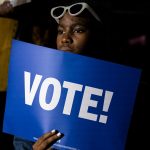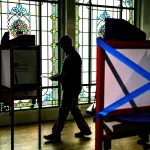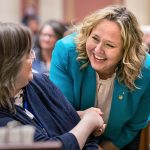This column originally ran in The 19th’s weekly newsletter. Subscribe here.
The right to vote is fundamental to American democracy — and covering the ways in which that right is being challenged will be critical as we enter the 2022 midterms and 2024 presidential election.
That’s why starting this week, I am The 19th’s first state politics and voting reporter, an evolution of my previous role as statehouses reporter. My new beat will incorporate a lot of what I’ve already been covering: the women, women of color and LGBTQ+ people running for office and enacting policy outside of the halls of Congress. But my focus on voting will add another layer.
The 19th is still covering what’s happening in statehouses, as our newsroom has showed with colleagues writing extensively about state policy around abortion, LGBTQ+ people and education.
Conspiracy theories and lies about the 2020 election, the most secure election in U.S. history, continue to have ripple effects on laws and the administration of election rules. That in turn is impacting election workers, voting advocates who help turn out the vote in their communities and everyday voters.
In a lot of ways, The 19th — a newsroom named after an amendment that granted women the right to vote, a right largely extended to only White women for decades — has been committed to covering voting since we launched in 2020.
Just as we’ve covered the complicated history of the 19th Amendment, we have looked at the policies shaping voting today. That includes publishing election explainers, writing about how voting policy affects trans people, covering voting rights groups and highlighting the election workers fighting disinformation.
In 2022 we’ve already looked at the implications of election deniers and the harassment of election workers, a workforce dominated by women.
The 19th’s coverage will include more explainers and on-the-ground reporting about the people impacted by voting policy — including the Black women and women of color at the forefront of organizing. It will look at the secretary of state races and policymakers who will impact election administration ahead of the next presidential election. And it will be on the lookout for solutions being led in part by longtime election officials who help run our decentralized voting system.
Many of us have stories about voting: about our pride or sense of duty, our confusion over complicated processes or gratitude for someone who helped us. My first experience was in 2004, when I was a college student in Massachusetts and requested an absentee ballot from my home state of Florida to vote in that year’s presidential election. I waited for my ballot to arrive. Except it didn’t, no matter how many times I peered into my dorm mailbox.
I finally called the local election office and learned a clerical error had placed my ballot application on hold. In the end, I was able to vote. But I often wonder what would have happened if I hadn’t called to ask about my missing ballot. Were there others like me?
I want to hear your stories and your thoughts. What story ideas should I consider? What’s being underreported? Who should I be talking to? Help shape our coverage by filling out this form. You can also directly email me. I look forward to hearing from our readers.





